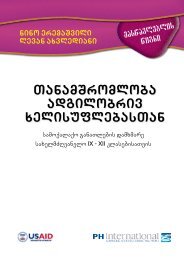The Geneva Protocol, by David Hunter Miller
The Geneva Protocol, by David Hunter Miller
The Geneva Protocol, by David Hunter Miller
Create successful ePaper yourself
Turn your PDF publications into a flip-book with our unique Google optimized e-Paper software.
CHAPTER XX. 107<br />
with the Council or the Assembly of the League of Nations.<br />
Again, there are many possible reservations as to the precise stage at which a dispute may be laid before the<br />
Court. <strong>The</strong> most far-reaching of these would be to make the resort to the Court in connection with every<br />
dispute in respect of which its compulsory jurisdiction is recognised contingent upon the establishment of an<br />
agreement for submission of the case which, failing agreement between the parties, would be drawn up <strong>by</strong> the<br />
Court itself, the analogy of the provisions of the Hague Convention of 1907 dealing with the Permanent Court<br />
of Arbitration being thus followed.<br />
It might also be stated that the recognition of the compulsory jurisdiction of the Court does not prevent the<br />
parties to the dispute from agreeing to resort to a preliminary conciliation procedure before the Council of the<br />
League of Nations or any other {172} body selected <strong>by</strong> them, or to submit their disputes to arbitration in<br />
preference to going before the Court.<br />
A State might also, while accepting compulsory jurisdiction <strong>by</strong> the Court, reserve the right of laying disputes<br />
before the Council of the League with a view to conciliation in accordance with paragraphs 1-3 of Article 15<br />
of the Covenant, with the proviso that neither party might, during the proceedings before the Council, take<br />
proceedings against the other in the Court.<br />
It will be seen, therefore, that there is a very wide range of reservations which may be made in connection<br />
with the undertaking referred to in Article 36, paragraph 2. It is possible that apprehensions may arise lest the<br />
right to make reservations should destroy the practical value of the undertaking. <strong>The</strong>re seems, however, to be<br />
no justification for such misgivings. In the first place, it is to be hoped that every Government will confine its<br />
reservations to what is absolutely essential. Secondly, it must be recognised that, however restrictive the scope<br />
of the undertaking may be, it will always be better than no undertaking at all.<br />
<strong>The</strong> fact that the signatory States undertake to accede, even though it be with reservations, to paragraph 2 of<br />
Article 36 may therefore be held to constitute a great advance.<br />
Such accession must take place at latest within the month following upon the coming into force or subsequent<br />
acceptance of the <strong>Protocol</strong>.<br />
It goes without saying that such accession in no way restricts the liberty which States possess, under the<br />
ordinary law, of concluding special agreements for arbitration. It is entirely open to any two countries<br />
signatory of the <strong>Protocol</strong> which have acceded to paragraph 2 of Article 36 to extend still further, as between<br />
themselves, the compulsory jurisdiction of the Court, or to stipulate that before having recourse to its<br />
jurisdiction they will submit their disputes to a special procedure of conciliation or even to stipulate, either<br />
before or after a dispute {173} has arisen, that it shall be brought before a special tribunal of arbitrators or<br />
before the Council of the League of Nations rather than to the Court.<br />
It is also certain that up to the time of the coming into force or acceptance of the <strong>Protocol</strong> accession to<br />
paragraph 2 of Article 36 which will thenceforth become compulsory, will remain optional, and that if such<br />
accession has already taken place it will continue to be valid in accordance with the terms under which it was<br />
made.<br />
<strong>The</strong> only point which may cause difficulty is the question what is the effect of accessions given to the<br />
<strong>Protocol</strong> if the latter becomes null and void. It may be asked whether such accessions are to be regarded as so<br />
intimately bound up with the <strong>Protocol</strong> that they must disappear with it. <strong>The</strong> reply must be in the negative. <strong>The</strong><br />
sound rule of interpretation of international treaties is that, unless there is express provision to the contrary,<br />
effects already produced survive the act from which they sprang.<br />
<strong>The</strong> natural corollary is that any State which wishes to make the duration of its accession to Article 36
















